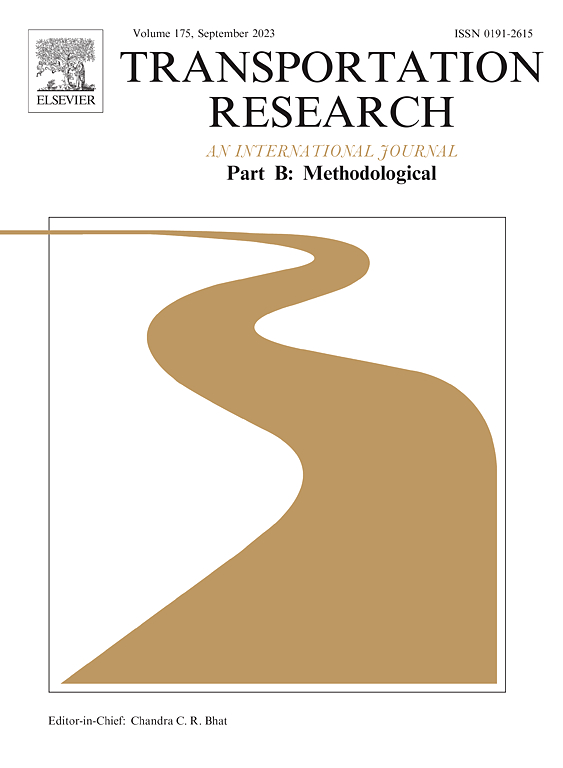Deep learning-based travel choice prediction with provable and adaptable fairness guarantees
IF 6.3
1区 工程技术
Q1 ECONOMICS
引用次数: 0
Abstract
Deep Learning (DL) models offer substantial potential for travel choice predictions but are often plagued by algorithmic unfairness where disadvantaged population groups such as racial minorities and low-income populations often receive disproportionately worse prediction outcomes (e.g. accuracy) compared to their counterparts. Studies to address this issue in the transportation domain are relatively new and they fail to provide provable fairness guarantees and cannot address the diverse interpretations of fairness in practice. This study introduces a novel DL approach that provides provable fairness guarantees while being adaptable to various fairness standards. It embeds statistical hypothesis testing within a practical equality constraint to control disparities in prediction accuracy across different population groups, thus providing provable and adaptable fairness guarantees. This approach results in a threshold modification problem, formulated as a mixed-integer non-linear programming model that is proven to be NP-hard. To allow for efficient problem solving, theoretical properties of the threshold modification problem are investigated, enabling the decomposition of the original problem into smaller, more manageable subproblems. This decomposition provides insights into the problem's structure and enables the development of an efficient "Accuracy-First-Threshold-Second " algorithmic framework. Within this framework, an exact solution method is proposed to achieve optimal solutions, whereas a heuristic method, incorporating a sandwich algorithm and a bounded-enumeration algorithm, is designed to efficiently approximate near-optimal solutions. Extensive experiments demonstrate the computational performance of the proposed solution algorithms as well as the ability of the proposed fair DL approach to provide provable and adaptable fairness guarantees for travel choice predictions. This study offers a flexible and theoretically robust solution to fairness in travel choice prediction, with potential applications for enhancing equity in transportation systems.
基于深度学习的可证明和适应性公平性保证的出行选择预测
深度学习(DL)模型为旅行选择预测提供了巨大的潜力,但经常受到算法不公平的困扰,弱势群体,如少数民族和低收入人群,与同行相比,往往会得到不成比例的更差的预测结果(例如准确性)。在交通运输领域解决这一问题的研究相对较新,它们未能提供可证明的公平保证,也无法解决实践中对公平的各种解释。本研究提出了一种新的深度学习方法,该方法提供了可证明的公平保证,同时适应各种公平标准。它将统计假设检验嵌入到实际的平等约束中,以控制不同人群之间预测精度的差异,从而提供可证明和可适应的公平性保证。这种方法导致了一个阈值修改问题,它被表述为一个被证明是np困难的混合整数非线性规划模型。为了有效地解决问题,研究了阈值修改问题的理论性质,从而将原始问题分解为更小、更易于管理的子问题。这种分解提供了对问题结构的洞察,并使开发高效的“精度-第一-阈值-第二”算法框架成为可能。在此框架下,提出了精确解方法来获得最优解,而结合三明治算法和有界枚举算法的启发式方法来有效地逼近近最优解。大量的实验证明了所提出的解决算法的计算性能,以及所提出的公平深度学习方法为旅行选择预测提供可证明和可适应的公平性保证的能力。本研究为出行选择预测中的公平性问题提供了一个灵活且理论上稳健的解决方案,在提高交通系统公平性方面具有潜在的应用前景。
本文章由计算机程序翻译,如有差异,请以英文原文为准。
求助全文
约1分钟内获得全文
求助全文
来源期刊
CiteScore
12.40
自引率
8.80%
发文量
143
审稿时长
14.1 weeks
期刊介绍:
Transportation Research: Part B publishes papers on all methodological aspects of the subject, particularly those that require mathematical analysis. The general theme of the journal is the development and solution of problems that are adequately motivated to deal with important aspects of the design and/or analysis of transportation systems. Areas covered include: traffic flow; design and analysis of transportation networks; control and scheduling; optimization; queuing theory; logistics; supply chains; development and application of statistical, econometric and mathematical models to address transportation problems; cost models; pricing and/or investment; traveler or shipper behavior; cost-benefit methodologies.

 求助内容:
求助内容: 应助结果提醒方式:
应助结果提醒方式:


